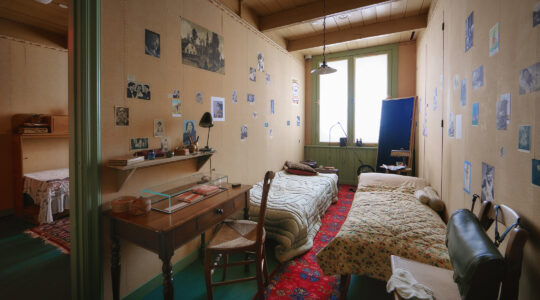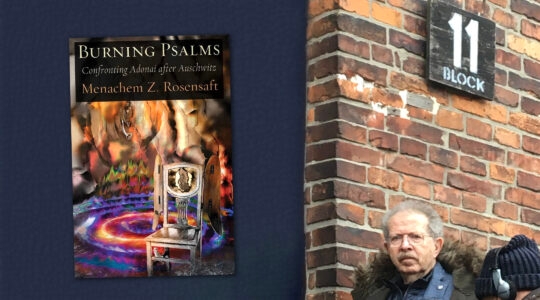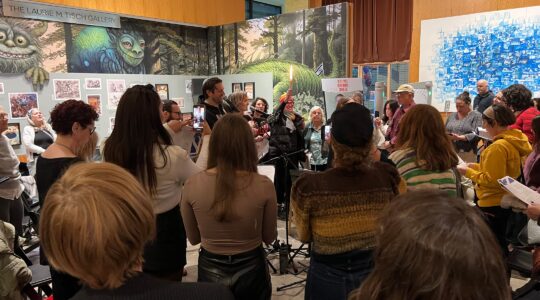We have reached a point in the history of the moving image that the French film magazine Cahiers du Cinema regularly reviews video games in its pages. I note this with no rancor. It’s merely my way of saying that the presence at the New York Film Festival for a second consecutive year of “Convergence,” a sidebar event focused on trans-media, cross-platform projects, is entirely in keeping with the direction that this art is evolving. Perhaps film was once Janus-faced, looking simultaneously at fiction and documentary (although even that is an oversimplification). Today, you can barely keep track of the facets of this jewel.
Consider one of the most interesting programs in this year’s “Convergence” — “Empire,” a self-described “immersive documentary project” created by Eline Jongsma and Kel O’Neil. The project takes as its starting point the long-dead imperial sprawl created by the Dutch, which stretched from the Low Countries to Indonesia, from Suriname to New York (née New Amsterdam, you’ll recall). The duo have spent four years examining the traces of that empire in 10 countries through film and video, on multiple screens, installations and, finally, with an impressive online presence. At the Film Festival, their work was scattered across much of Lincoln Center in both conventional screenings and unexpected, amusing settings like the bathrooms in the Elinor Bunin Center.
One of the most unexpected and compelling manifestations of the historical Dutch presence occurs in northern Indonesia, where the filmmakers profiled a young Indonesian man who is now one of the leaders of what may be the unlikeliest synagogue on the planet. Congregation Ohel Yaakov, in Minhasa, is a handsome little building in a near-tropical setting in the largest Muslim nation in the world (although North Sulawesi, where it is located, is predominantly Christian). When he discovered that his family had Jewish roots, Yaakov Baruch (the name he is identified by for purposes of the film) decided to explore that connection. Today, he is a practicing and observant Jew, as we see on-screen.
In one of those bizarre ironies only human beings can create, a fellow Indonesian, HS Permadi, runs a war re-enactment group called the “Niederlande Kampfgruppe” (Netherlands Battle Group), which meets on weekends in a park in Jakarta to recreate the activities of the 20 Indonesians who joined the Dutch battalion of the Waffen SS. Permadi doesn’t appear to harbor any particular animus towards Jews or the Dutch; he’s just a distinctly oddball guy who likes to dress up in SS gear and play soldiers in the woods. The juxtaposition of his child-like group miming combat, death and destruction while Baruch davens Shacharit is a deft commentary on the kind of lessons that people can take from globally distant histories, sometimes uncomprehendingly.
Back in the more conventional world of motion pictures, when her brilliant Shoah drama “In Darkness” was released theatrically in the U.S. a few years ago, Agnieszka Holland told The Jewish Week, “Even the effect of a kitschy television series like ‘Holocaust’ — it changed the vision of Americans and Germans on this subject. Perhaps for educational purposes even embellishment is better than complete silence.”
At the time, Holland was beginning work on a miniseries of her own for HBO Europe, a recounting of the tragic circumstances surrounding the death of Jan Palach, a Prague college student who immolated himself in protest against the Soviet invasion of Czechoslovakia in 1968. Holland was in Prague at the time studying film, became active in the protests despite being a Polish national, and even spent some time in jail. She brings the immediacy of the eyewitness to “Burning Bush,” the four-hour film that results.
Palach’s death set wheels turning throughout the subterranean worlds of Czech/Soviet communism, with pressure from Moscow and from anti-reform hardliners in Prague putting local police officials under the gun. At the same time, the heat would come down on the students who were organizing in support of the Prague Spring reformers and against the Soviet tanks in the streets. The match with which Palach incinerated himself burned a lot of other people almost as badly, including his apolitical mother and brother. When a prominent mid-level hardliner denounced Palach as a stooge for right-wing conspirators, they had the nerve to sue him for defamation. The lawsuit and its aftermath provide Holland with a compelling armature on which to examine the wide range of choices facing people in a police state. Brilliantly acted by a splendid ensemble cast of Czech veterans, this is the kind of project that lesser filmmakers would make into a stentorian marching song; in Holland’s hands, it is subtler and more profound.
“Burning Bush” is almost as visually shadowy as “In Darkness,” but here the difficulties of vision become more metaphor than reality. Where the earlier work uses splashes of light to highlight the emotional barriers between the various Jewish families hiding from the Nazis, here there is an overall grayness that suggests a world of moral ambiguities in which one seldom has clear-cut choices as the pressure to conform and to collaborate becomes intense, even lethal. Experienced as a four-hour motion picture, the project is claustrophobically intense; as a three-part teleplay it might be less harrowing and therefore less effective.
Hany Abu-Assad’s newest film, “Omar,” takes up pretty much where “Paradise Now,” his 2005 drama about suicide bombers, left off. The Israeli occupation continues. The factionalized Palestinian struggle against Israel continues. The intrigues that the situation inevitably breeds continue as well, here providing a motivation for a twisty plot that frequently feels like a feature-length version of an episode of “Burn Notice,” but without the slick Miami settings and with a lot more at stake.
Omar (Adam Bakri) is a baker who lives on the West Bank. He regularly “jumps” the Wall to see his childhood friends Tarek (Eyad Hourani) and Amjad (Samer Bisharat), but most of all to see Tarek’s sister Nadia (Leem Lubany), who he hopes someday to marry. Tarek is a militant attached to an unnamed group and, out of a sense of lifelong loyalty and a certain late adolescent thirst for adventure, Omar participates with the other two young men in an ambush that results in the death of an Israeli soldier. Now the trio is on the radar of Rami (Waleed F. Zuaiter), an Israeli agent who wants to flip at least one of them.
Abu-Assad has said that the politics of the film “should be part of the conversation, but I hope in a more tangential way,” and to that end, “Omar” functions for the most part like a paranoia-inducing thriller, a sort of neo-realist reworking of Hitchcock or DePalma, but with more grit than the latter and less art than the former. As his previous work amply displayed, Abu-Assad has the talented filmmaker’s gift of keeping an narrative flowing while including enough carefully observed detail to raise it above the merely propulsive, and his screenplay is cleverly enough structured that the series of traps that Omar finds himself caught up in are both believable and compelling. If you are looking for a treatise on the Israel-Palestine conflict, you’ll be disappointed. If you want a nicely worked-out thriller with a core of emotional longing (and some terrific young first-time actors), “Omar” will readily suffice.
The New York Film Festival continues through Oct. 13. Most films will be screened at Alice Tully Hall (Broadway and 65th Street), others at the Walter Reade Theater or the Elinor Bunin Munroe Film Center (both on 65th Street between Broadway and Amsterdam Ave.). For a complete schedule, go to www.filmlinc.com. To see “Empire” go to www.empireproject.eu; there you will find not only the four component parts of the video/film but also a nicely written blog by the filmmakers that fills in a lot of the backstory.
The New York Jewish Week brings you the stories behind the headlines, keeping you connected to Jewish life in New York. Help sustain the reporting you trust by donating today.




